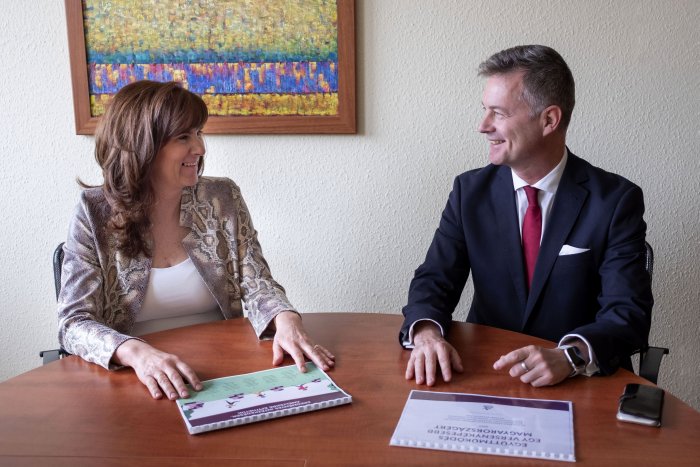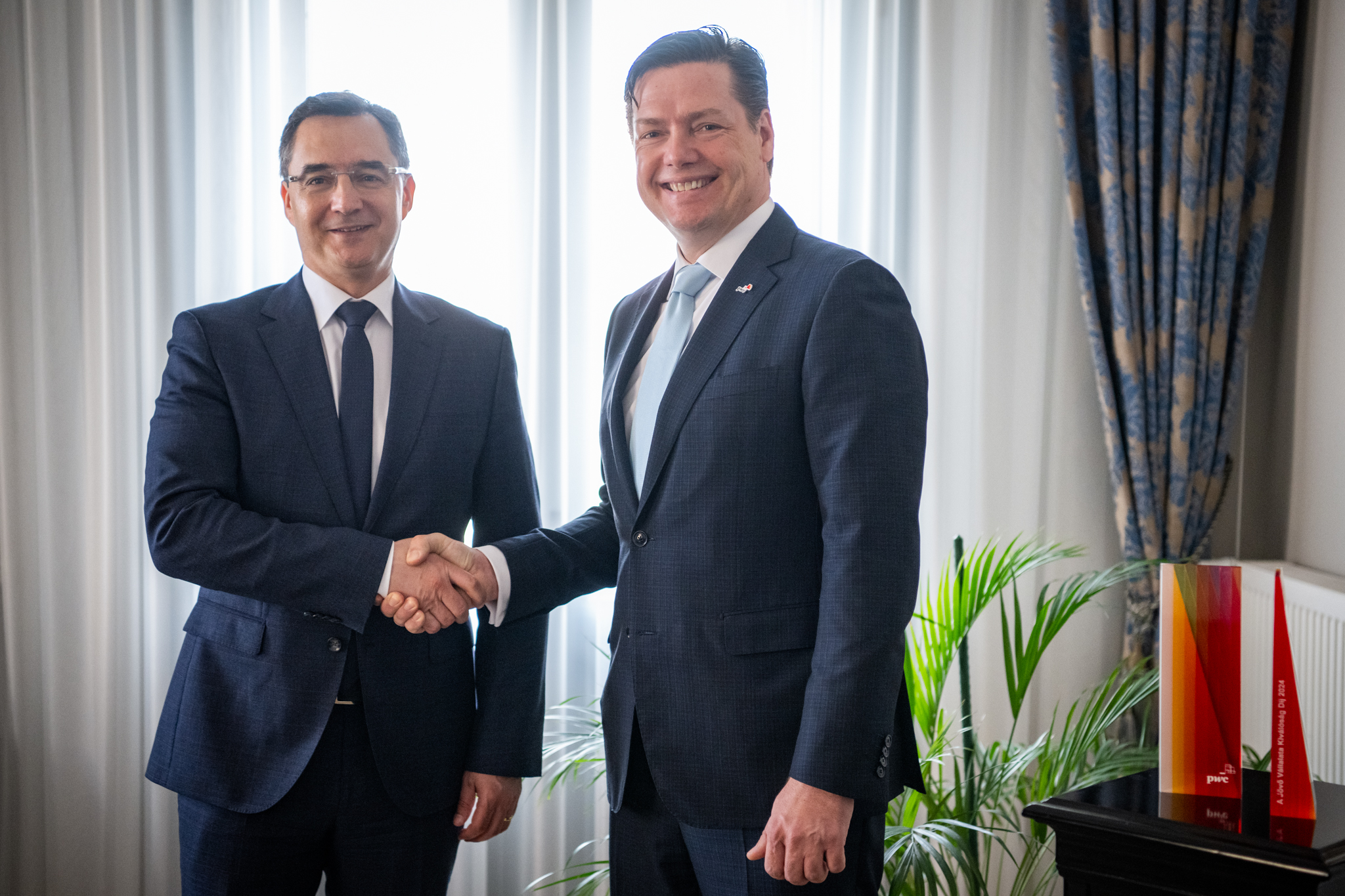Digitization a Priority in AmCham’s Recommendations to Government

The American Chamber of Commerce in Hungary has sent its latest recommendation package to the government. President Farkas Bársony and CEO Írisz Lippai-Nagy walk the Budapest Business Journal through the key highlights.
AmCham CEO Írisz Lippai-Nagy, left, with President Farkas Bársony.
BBJ: The latest “Cooperation for a More Competitive Hungary” recommended package has now been sent to the government. Of course, it is a complex, inter-connected document, but what would you say are the stand out recommendations? Is there one game changer here?
Farkas Bársony: Our recommendation package focuses on four areas: general business climate; competitive workforce and education; innovation and R&D; and digitalization. This year, digitalization has become a priority. Considering Hungary’s strengths in ICT, the digital revolution offers tremendous opportunities for us to find a competitive edge and we wanted to emphasize this in our proposal. We also have new suggestions to encourage innovation, tech investments and to support cooperation between higher education institutions and businesses in R&D&I.
Írisz Lippai-Nagy: Career orientation is another subject where we felt a growing momentum. We started the Career Orientation Program last November to connect secondary schools with companies to facilitate knowledge-sharing. This spring we have launched a roadshow in Debrecen, Székesfehérvár and Pécs to further expand the initiative outside the capital.
BBJ: Does it differ markedly from last year’s package? Is this evolution or revolution?
FB: Evolution. We always have new suggestions to address issues critical to our competitiveness. Of course, there are recommendations we carry over from previous years – finetuned or expanded – such as the unification of digital government services.
ÍLN: Perseverance is essential. We know that most of our proposals cannot be executed in a year.
BBJ: If there are two issues in the Hungarian news more than any others, aside from politics, it is the labor crisis and the country’s demographics. What recommendations does the package have on these fronts?
FB: The solution to the labor crisis and the foundation of long-term competitiveness is a reformed education and training system. We need to make sure that the next generation of our workforce is better prepared for the expectations of the rapidly changing labor market. That is why we advocate introducing a skill- and competency-focused national curriculum, stronger business and university cooperation and more effective foreign language education.
ÍLN: We do not forget about our teachers either. They are essential to high-quality education and the prestige of this profession must be restored. The chamber believes stronger financial support, revised training and more effective cooperation with the corporate sector are the first steps in the right direction.
On the other hand, adult training and retraining could be a short-term solution to labor issues. The system must be revamped first to respond to the challenges of our times: skills development is of the utmost importance. Moreover, we need to promote flexible work arrangements, particularly part-time employment and teleworking. The keywords are adaptability and flexibility in all areas.
BBJ: The package is a reflection of AmCham’s year-long advocacy, but how long does the package itself take to put together to present to government? What are the follow up steps from here?
ÍLN: It takes a year to compile the package. Our advocacy groups, the policy task forces and committees, serve as the hub of knowledge sharing within the chamber. They work tirelessly to refine the collected input which is then discussed with representatives of the government.
In 2018, we consulted ministers Péter Szijjártó [Foreign Affairs and Trade], László Palkovics [Innovation and Technology], Mihály Varga [Finance] and László Trócsányi [Justice] as well as state secretaries László György, Norbert Izer and the various representatives of the Ministry of Human Capacities, the Hungarian Investment Promotion Agency, the National Research, Innovation and Development Office, the Hungarian Intellectual Property Office and the National Authority for Data Protection and Freedom of Information.
FB: And the cycle continues. We have already sat down with State Secretary László György and we will meet Minister Szijjártó in April. The recommendation package is the collective effort of dozens of people who are devoted to make a difference. It is truly special to be a part of this process.
BBJ: A few years back, AmCham fundamentally changed the way it went about its advocacy work; the package is one of the results of that overhaul. Has it achieved the results you hoped for?
FB: Absolutely. Over the years, we have built a strong working relationship with the government. They count on the expertise of our membership. Since the first package in 2016, several policy measures and initiatives introduced by the government are harmonious with our proposals: the taxation and incentive system related to R&D activities has been redesigned and improving the local innovation ecosystem has become a priority. Further reductions have been made to taxes on employment, new amendments were introduced to promote flexible employment and the national curriculum has been modernized to focus on competencies and skills.
BBJ: When you peer-evaluate the Hungarian economy with your sister organizations in the region, how does Hungary score? Is this an easy country in which to do business? Is it getting easier?
ÍLN: The competition is fierce, but we are in a good position; I believe the growing number of investments can attest to that. We provide stability and a great infrastructure. Even though it is difficult to find the right talent, investors are satisfied with the quality of our workforce and the costs of employment are still favorable.
FB: The reduction of the corporate income tax to 9% was an absolute game changer. The “Invent in Hungary” paradigm shift is another great direction as we believe that shifting our focus towards high added value activities will move our economy forward. As for AmCham, we are determined to work with all relevant stakeholders to proceed with our mission to make Hungary more competitive.
SUPPORT THE BUDAPEST BUSINESS JOURNAL
Producing journalism that is worthy of the name is a costly business. For 27 years, the publishers, editors and reporters of the Budapest Business Journal have striven to bring you business news that works, information that you can trust, that is factual, accurate and presented without fear or favor.
Newspaper organizations across the globe have struggled to find a business model that allows them to continue to excel, without compromising their ability to perform. Most recently, some have experimented with the idea of involving their most important stakeholders, their readers.
We would like to offer that same opportunity to our readers. We would like to invite you to help us deliver the quality business journalism you require. Hit our Support the BBJ button and you can choose the how much and how often you send us your contributions.








